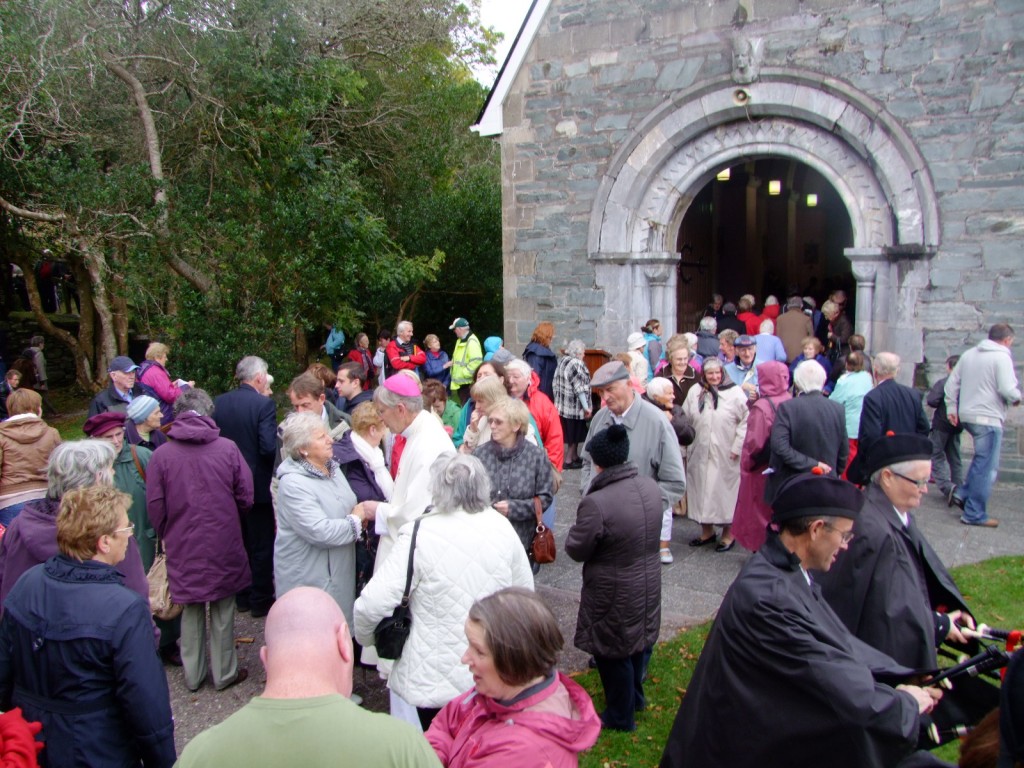
Kieran’s Our City, Our Town Article,
Cork Independent, 15 December 2011
In the Footsteps of St. Finbarre (Part 279)
A Golden Chain
“The monastery is enshrined deep in the hearts of the people of Cork. The historian and the archaeologist love the place, too, for its many interesting associations; while the beauty of the country attracts the general tourist. The changing hands of time have not been at rest during the twelve hundred years that separate us from St Finbarr. On the contrary, they have been increasingly active. Storms and revolutions have rolled over the land. The piety and learning, implanted here by Patrick and Finbarr, and the other saints and scholars of the fifth, sixth and seventh centuries, had to pass through the ordeal of fire and sword (Southern Star, 3 October 1914, p.3)
This article arose out of the above quote, that a place such as Gougane Barra has survived through many ages of turmoil; that there is one thing having a physical monument, but these monuments must also be invested with human thought them to make them relevant to people’s lives. Indeed, reading newspapers such as the Southern Reporter about the nature and content of the Gougane Barra ceremonies every September/ October for the twentieth century reveals one of the many ways to enter the ‘mindscape’ of Gougane Barra. One of the aspects that shine out is the stability of the site’s essence in a world of change.
For example in early October 1914 the message by local parish priest Fr. James O’Leary asked the people to respect those whom “God had given and who in a special manner evidenced the ordinances by raising up such saints as Patrick and the other saints who had done so much for religion in Ireland…it was the duty of us all to honour the saint [St. Finbarr], to emulate his example in order to share his glory”. But these messages are placed against what else was happening in the world. Reading the Cork Examiner in early October 1914, World War I was in its first year. In October, 33,000 Canadian troops departed for Europe, the largest force to ever cross the Atlantic Ocean at the time. Belgium fell to German troops.
Similarly, in 1941 during the time, when the German invasion of the Soviet Union was in full swing, in early October 1941, the Southern Star reports on the sermon of Rev. L. Kelleher of Farranferris, Cork City; he said that the ceremony was the “occasion for thanksgiving to God and St. Finbarr for the hermitage of faith and Catholic life in Cork City and County and intercession to God, and to pray for the spirit of St Finbarr, for the grace to good works and to pray in the spirit of St Finbarr and our Catholic fore-fathers. The solution of social evils and modern difficulties to our Catholic precepts, in giving full play to the principles of charity towards God and love for our neighbours”.
The Southern Star for 2 October 1954 (p.1) records Rev. C. Lynch, C.C. Inchigeela preaching in Irish and in English; “we have come in pilgrimage out of our sense of devotion to God and in revered memory of the man who chose this place for his cloister that he might be free from the turmoil of the world and commune in peace with his God, the very atmosphere of the lake and mountain breathe peace because the peace of God is here”. The sermon was pitched against the backdrop of the Cold War and negotiations across international media of the USA, Great Britain, France and USSR agreeing to end occupation of Germany.
Ten years later the Southern Star, on the 3 October 1964 (p.10) reported on the sermon of Rev. L. O’Regan, C.C., Ballingeary, who noted: “There is a golden chain linking our pilgrimage there today with life and times of Ireland’s Golden Age. This strong and ancient golden chair is unique in the annals of Christendom, and a source of admiration and pride to any Irish Catholic who pauses to consider it. There never have been any weak links in the chain that link us here today with the faith of St Finbarr”. During that month Martin Luther King was awarded a Nobel peace prize for his work.
This year on 25 September 2011 Fr. Donal Cotter at the ceremonies, I thought, gave a thought provoking sermon. He noted “Finbarr found in the nature of the place and in the nature of God a unique combination, a unique relationship where his restless soul could find a level of peace, but he was never sure when that restless soul was finding peace, because he kept travelling further on and back again. And because of that, that represents to me the idea that the soul never truly rests until it rests with God…So while he found rest here, his ultimate point was not found in this world, but in the next. We have come here today, always finding something here ourselves, whatever that may be, a moment of solitude, a prayer for someone who is unwell, because people do the rounds here for those, the ending of a long journey, the finding of something within yourself that will help you move on from here.”
To be continued…
Caption:
621a. Bishop John Buckley greeting pilgrims, Gougane Barra Sunday Ceremonies 2011 (Picture: Kieran McCarthy)